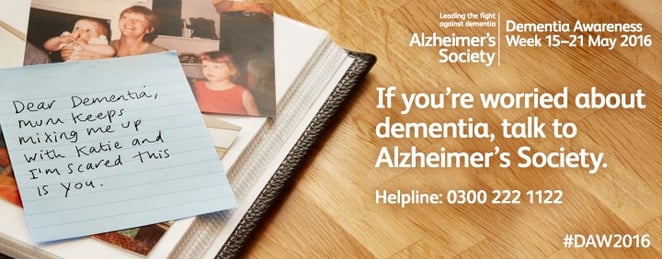- Privacy Policy
- Terms & Conditions
- Contact us
- ©Isabel Healthcare 2020
Dementia Awareness Week | The Alzheimer's Society

This week is Dementia Awareness Week. The Alzheimer’s Society, which is a UK charity, is encouraging anyone concerned to read up and get in touch with them in 2016. Alzheimer’s and Dementia should be talked about and not feared, as catching the symptoms early can have vast improvements on the progression of the condition, and overall quality of life. So we’re explaining what dementia is, the different types of dementia including Alzheimer’s, and the tell tale symptoms to look out for.
What is Dementia?
As described in the dictionary, dementia is “a chronic or persistent disorder of the mental processes caused by brain disease or injury and marked by memory disorders, personality changes, and impaired reasoning.” Many people use the phrases dementia and Alzheimer’s interchangeably, but this isn’t strictly accurate. Alzheimer’s is the most prevalent dementia condition,with 520,000 people suffering symptoms in the UK, but there are others. Put simply, dementia is a damaging of the brain, leading to a decline in the efficiency of the brain’s functions. This is what gives the most common symptoms of memory loss, confusion and disorientation.
Alzheimer’s is usually present in older patients, as it is quite simply a gradual deterioration of the cells in the brain; proteins build up in the brain and cause gaps between nerve cells, which then eventually die. As well as this, people with Alzheimer’s have a shortage of signal transmitting chemicals, which means the messages are not passed on as effectively as in a healthy brain.
Vascular Dementia is another common disease under the umbrella of dementia, affecting around 150,000 people in the UK This is usually caused following a stroke or series of mini strokes, and causes brain cells to die due to oxygen starvation.
There are many other types of dementia, including fronto-temporal dementia, where the frontal lobe and therefore personality is often more affected, and even prion dementia, where an infectious protein attacks the cells in the brain and kills them.
What are the symptoms of Alzheimer’s and Vascular Dementia?
Symptoms in cognitive illnesses are often harder to spot than physical symptoms, as they affect a person’s mind and can be quite subtle at first. This makes it even more important for you to be alert, and be able to spot symptoms arising and get medical attention. The symptoms are slightly different for different types of dementia, so we will look at the two most common types.
Azheimer’s:
- Losing things around the house or putting things in strange places
- Forgetting the names of loved ones, or common objects
- Forgetting recent events or conversations, and even repeating conversations
- Getting lost in a familiar environment
- Forgetting birthdays or arrangements made
Symptoms of memory loss are usually the earliest symptoms of Alzheimer’s, but others can develop, including:
- Difficulty following a conversation or using language incorrectly
- Problems with coordination and spatial awareness
- Being unable to make decisions or solve problems
- Struggling to do a series of steps e.g. make a meal
- Becoming unsure of the day, date or time.
Vascular Dementia:
- Struggling to make decisions or solve problems
- Difficulties making a meal or other sequenced activities
- Longer thought processing than normal e.g. not responding straight away
- Short periods of sudden confusion about surroundings and situations
- Problems concentrating
Although not the main symptoms, other pointers of vascular dementia include:
- Mild problems recalling recent events or conversations
- Speech becoming less fluent and flowing
- Issues with spatial awareness and coordination.
If you’re concerned about any of the symptoms discussed here, put them into the Isabel Symptom Checker, which works with natural language and free text, and take the finding to discuss with a doctor.

Jason Maude
Jason is the CEO and Co-founder of Isabel. Prior to co-founding Isabel, Jason spent 12 years working in finance and investment banking across Europe. His daughter, Isabel, fell seriously ill following a misdiagnosis in 1999 and this experience inspired Jason to abandon his city career and create Isabel Healthcare Ltd.
Subscribe Here!
Recent Posts
Virtual Triage: Do more questions lead to better patient outcomes?
One of the common misconceptions related to virtual triage / symptom checker tools is that the more..Webinar: Using Virtual Triage To Transform Patient Access
Outdated contact centers are posing problems for today's health systems. As longer hold times..List Of Categories
- Differential Diagnosis Decision Support
- Differential diagnosis
- Symptom Checker
- Symptoms
- Medical Error
- Patient Disease Information
- Disease
- Diagnostic Decision Support
- Clinical Decision Support
- Isabel 1 Minute Read
- Diagnosis Error
- Diagnosis Skills Cases
- Healthcare Informatics
- Medical Education
- Patient Engagement
- Clinical Reasoning
- Evidence-based Medicine
- Symptom Triage
- Nurse Practitioner Education
- Nursing Decision Support
- Partnership
- Public Health
- COVID-19
- EHR
- Patient Empowerment
- Patient Safety
- rare disease

Start your FREE Trial today
Try the Isabel Pro DDx generator for 30-days - no payment card details required.




